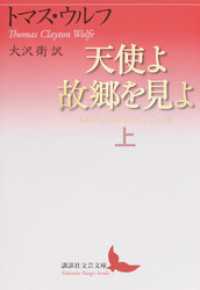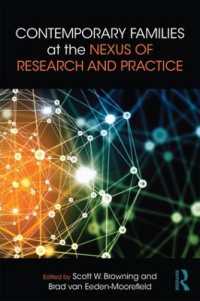- ホーム
- > 洋書
- > 英文書
- > Cinema / Film
Full Description
Leading scholar Paul G. Pickowicz traces the dynamic history of Chinese filmmaking and discusses its course of development from the early days to the present. Moving decade by decade, he explores such key themes as the ever-shifting definitions of modern marriage in 1920s silent features, East-West cultural conflict in the movies of the 1930s, the strong appeal of the powerful melodramatic mode of the 1930s and 1940s, the polarizing political controversies surrounding Chinese filmmaking under the Japanese occupation of Shanghai in the 1940s, and the critical role of cinema during the bloody civil war of the late 1940s. Pickowicz then considers the challenging Mao years, including chapters on legendary screen personalities who tried but failed to adjust to the new socialist order in the 1950s, celebrities who made the sort of artistic and political accommodations that would keep them in the spotlight in the post-revolutionary era, and insider film professionals of the early 1960s who actively resisted the most extreme forms of Maoist cultural production. The book concludes with explorations of the highly cathartic films of the early post-Mao era, edgy postsocialist movies that appeared on the eve of the Tiananmen demonstrations of 1989, the relevance of the Eastern European "velvet prison" cultural production model, and the rise of underground and independent filmmaking beginning in the 1990s.
Throughout its long history of film production, China has been embroiled in a seemingly unending series of wars, revolutions, and jarring social transformations. Despite daunting censorship obstacles, Chinese filmmakers have found ingenious ways of taking political stands and weighing in—for better or worse—on the most explosive social, cultural, and economic issues of the day. Exploring the often gut-wrenching controversies generated by their work, Pickowicz offers a unique and perceptive window on Chinese culture and society.
Contents
Introduction: The Sorrows and Joys of Chinese Filmmaking: Political and Personal Contexts
Chapter 1: Shanghai Twenties: Early Chinese Cinematic Explorations of the Modern Marriage
Chapter 2: The Theme of Spiritual Pollution in Chinese Films of the 1930s
Chapter 3: Melodramatic Representation and the May Fourth Tradition of Chinese Cinema
Chapter 4: Never-Ending Controversies: The Case of Remorse in Shanghai and Occupation-Era
Chinese Filmmaking
Chapter 5: Victory as Defeat: Postwar Visualizations of China's War of Resistance
Chapter 6: Acting like Revolutionaries: Shi Hui, the Wenhua Studio, and Private-Sector Filmmaking,
1949-1952
Chapter 7: Zheng Junli, Complicity, and the Cultural History of Socialist China, 1949-1976
Chapter 8: The Limits of Cultural Thaw: Chinese Cinema in the Early 1960s
Chapter 9: Popular Cinema and Political Thought in Early Post-Mao China: Reflections on Official
Pronouncements, Film, and the Film Audience
Chapter 10: On the Eve of Tiananmen: Huang Jianxin and
-

- 電子書籍
- 顧問など!(19)
-

- 電子書籍
- 天使よ故郷を見よ 上 講談社文芸文庫






